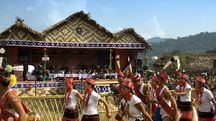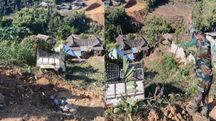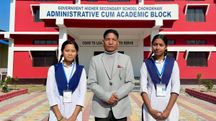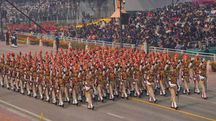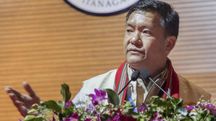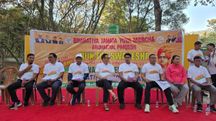
Arunachal: AAPSU calls for phase-wise bandh across the state from August 3
AAPSU have decided to launch a series of phase-wise bandh across the state starting from August 3, with regards to their earlier charter of demand submitted to the Government
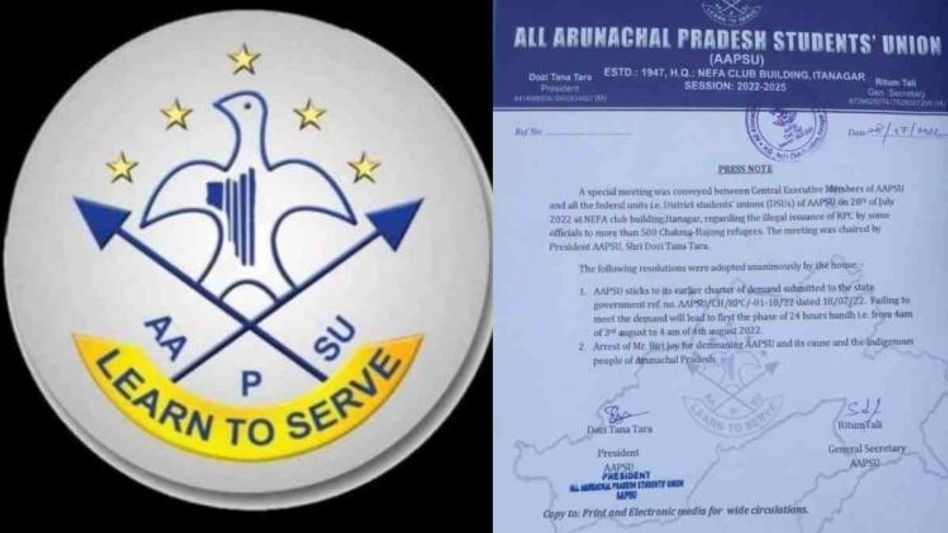 All Arunachal Pradesh Students’ Union (AAPSU)
All Arunachal Pradesh Students’ Union (AAPSU)All Arunachal Pradesh Students’ Union (AAPSU) have decided to launch a series of phase-wise bandh across the state starting from August 3, with regards to their earlier charter of demand submitted to the Government.
Earlier, on July 18, AAPSU had given 15 days ultimatum to the state Government if their demands are not heeded.
The apex students' body AAPSU has demanded that RPC (residential proof certificates) provided to Chakmas and Hajongs be canceled immediately, as well as the immediate suspension of Changlang Deputy Commissioner and Diyun EAC for allegedly granting RPC to over 500 Chakma-Hajongs.
Ritum Tali, General Secretary of AAPSU informed that since its inception AAPSU is vocal about this Chakma-Hajong refugee issue. General Secretary Tali informed that already these illegal immigrants have Refugee cards with them so why there is a need for a Residential Proof certificate.
“More than 500 Residential Proof Certificates (RPC) have already been issued to these refugees which is a matter of concern & threat to the rights of indigenous people of the state and AAPSU being apex student body of state treat it as a conspiracy against the interest of every Arunachalee” Tali added.
The union further sought that Bordumsa-Diyun MLA Samlung Mossang should be stripped of all the benefits enjoyed by him as people’s representative for allegedly allowing issuance of RPC to refugees & induction of one Robin Chakma as LDC in the Diyun EAC office.
AAPSU informed that a 'special' meeting was held at the NEFA Club building between Central Executive Members of AAPSU and its federal units to discuss the unlawful issue of RPC by certain authorities to more than 500 Chakma-Hajong refugees. AAPSU President Dozi Tana Tara and General Secretary Ritum Tali presided over the meeting.
The Union, meanwhile, demanded the arrest of one Biri Joy for ‘demeaning’ AAPSU and its cause, and the indigenous people of Arunachal Pradesh, it added.
On other hand, the APCSU Arunachal Pradesh Chakma students union appeals to Arunachal people to ignore the AAPSU bandh on August 3.
On July 28, the Arunachal Pradesh Chakma Students Union (APCSU) urged the people of Arunachal Pradesh not to respond to the All Arunachal Pradesh Students Union (AAPSUthreat )'s of a statewide bandh on August 3 from 4 a.m. onwards since its demands had not been met.
The AAPSU demanded on July 18 that the Pema Khandu-led government invalidate all Chakma-Hajong community residential proof certificates (RPCs), saying that at least 500 Chakma-Hajong refugees were awarded RPCs at Diyun in Changlang district.
They also sought the immediate suspension of Changlang deputy commissioner (DC) and extra assistant commissioner (EAC) of Diyun, as well as the "seizure of all benefits and facilities obtained by Bordumsa-Diyun MLA Samlung Mossang."
“The demands of the AAPSU are illogical as issuance of residence certificate to the Chakmas is based on laws of India. The order for arrest under the National Security Act can only be issued by the Deputy Commissioner. Are we expecting the Deputy Commissioner to issue an arrest warrant for himself under the NSA,” asked Rup Singh Chakma, president of APCSU.
“The state government of Arunachal Pradesh must not give in to such demands. Otherwise, the State government will be governed by mob rule and not the rule of law. The bandh causes inconvenience and loss to all the people. The Chakmas and Hajongs shall not participate and everything shall remain open in the Chakma and Hajong inhabited areas,” Chakma added.
The AAPSU also demanded the filing of an FIR and the arrest of Robin Chakma, a contract worker at the EAC office.
Meanwhile, Arunachal Pradesh Chief Minister Pema Khandu stated that his government is committed to finding a "permanent" solution to the vexing Chakma-Hajong issue and that outsiders are not permitted to settle in the frontier state because it is protected under the Bengal Eastern Frontier Regulation (BEFR), 1873.
He further stated that the state administration is planning to relocate the Chakma-Hajongs outside of Arunachal Pradesh.
"Chakma-Hajong is a vexed issue in the context of Arunachal Pradesh. They were given refuge in Arunachal by the Government of India with proper identification and documentation. But, over time there was an 'influx'. I had already briefed the Union Home Minister in this regard. We are trying for a permanent solution," Khandu told reporters on being asked about the reported issuance of residential proof certificate (RPC) to Chakmas and Hajongs in Changlang district, which stoked a controversy recently.
The CM had indicated that the BJP governments in the state and at the national level will work "in a lot more targeted manner" to transfer illegal immigrants "with due order" outside of the state.
“Arunachal being a tribal state, as per constitutional provisions, they (Chakmas-Hajongs) cannot settle down in our state. We will solve this vexed issue constitutionally’, CM Khandu said.
Meanwhile, the All Arunachal Pradesh Chakma Students Union has strongly opposed and objected to Chief Minister Pema Khandu's recent stance on the Chakma-Hajong problem. Speaking to the media, Drishya Muni Chakma, president of the APCSU, stated that the Chakmas and Hajongs have been living in the state for the last 60 years and that relocating the communities as recommended by Chief Minister Khandu would be nothing short of an injustice.

The Chakmas, a predominantly Buddhist community had fled from the Chittagong Hill Tracts of erstwhile East Pakistan (now Bangladesh) to India in 1964, following alleged communal violence and the construction of the Kaptai hydroelectric dam in Chittagong, which had displaced nearly one lakh people from the community. The Hajongs, a Hindu tribal group, had also taken refuge in India after fleeing from Mymensingh district around the same time, also because of alleged religious persecution.
The Indian government had back in 1972 decided to grant citizenship status to the Chakma and Hajong refugees following a joint statement by the PMs of India and Bangladesh.
The move had been opposed by the North Eastern Frontier Agency government (now Arunachal Pradesh government) at the time saying that it would not permit “outsiders” to settle in its territory as it would affect the demography. The issue was never resolved till now.
The Supreme Court in its judgment dated January 9, 1996, stated that “the State of Arunachal Pradesh, shall ensure that the life and personal liberty of each and every Chakma residing within the State shall be protected and any attempt to forcibly evict or drive them out of the State by organized groups, shall be repelled, if necessary, by requisitioning the service of para-military or police force as is necessary to protect the lives and liberty of the Chakmas”.
In 2015, the Supreme Court asked the Centre to grant citizenship to the Chakma and Hajong refugees. But several organizations and civil society groups in Arunachal Pradesh were against it, saying the decision would change the demography of the state and affect the minority status of the tribal population.
The Supreme Court also favored granting citizenship to the members of these two communities in 1996.
In their joint complaint, the two organizations had told the human rights body that several government welfare schemes have not been extended to the members of the community.
Copyright©2026 Living Media India Limited. For reprint rights: Syndications Today


